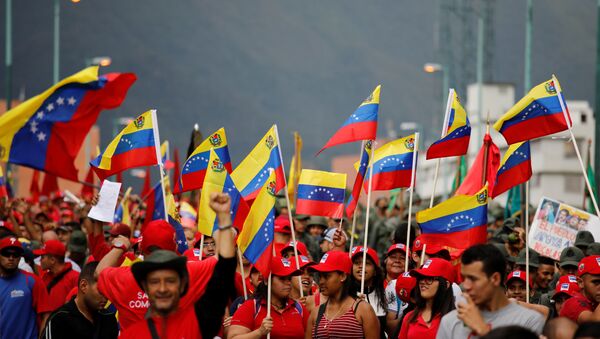One wouldn't be able to discern this iniquitous reality from mainstream Western news reporting, however. Alan MacLeod, an academic specializing in media theory and analysis — and member of Glasgow University's respected Media Group — set out to discover why.
In search of answers, he compiled 501 articles, both news reports and opinion pieces, on Venezuela published in American and British newspapers during four pivotal periods in the country's recent history — Chavez's election as President in 1998, the failed April 2002 US-orchestrated right-wing coup, his death in 2013, and the incendiary, blood-spattered opposition protests of 2014. He also conducted extensive interviews with many journalists and academics covering events within and without Caracas.
His findings are compiled in the book Bad News from Venezuela: Twenty years of fake news and misreporting — speaking exclusively to Sputnik journalist Kit Klarenberg, he summarizes the most shocking.
A Few Bad Men
Prior to 1998, mentions of Venezuela in the Western media were rare — upon the election of Chavez, and the resultant revolutionary changes his government instituted, the country was catapulted to the top of the mainstream news agenda, where it remains to this day.
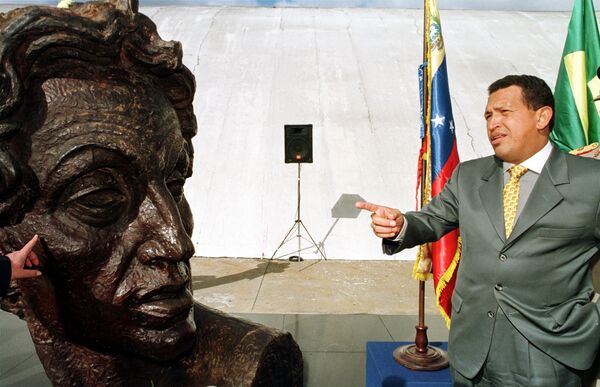
The radical President was a very divisive figure the world over from the day he took office — as Alan records, some viewed his new government as an inspirational model to follow, others that that it had transformed Venezuela into a "veritable terror state," that should be "invaded forthwith."
"I found almost all mainstream media reporting on Venezeula post-Chavez's election, seemingly irrespective of the apparent ideological inclination of the newspaper, offers a massively limited viewpoint, heavily focused on the negative end of the spectrum. Often this reporting has been contrary to the best empirical evidence available — studies conducted by the United Nations and the World Bank, for instance — which showed many positive things were happening in the country. Western journalists have almost uniformly presented Venezuela as sliding into dictatorship," Alan told Sputnik.
In a sense, media misrepresentation of Venezuela shouldn't surprise — for one, the smearing of governments and leaders threatening to the US Empire's commercial and financial interests in Latin America has a long and established history. Guatemala's Jacobo Arbenz, Cuba's Fidel Castro, Chile's Salvador Allende and Nicaragua's Sandinistas were all subjected to intense media vilification during their periods in power. However, Alan notes structural issues within the news industry also play an increasingly pivotal role in distorting media reportage.
"There've been huge cuts to journalism budgets in recent years, and mainstream outlets increasingly rely solely on major news agencies — Reuters, Bloomberg — for their information about foreign countries. As a result, a tiny cadre of Westerners — perhaps only a dozen people — are the source of most of the world's news about Venezuela. Furthermore, Bloomberg and Reuters have themselves outsourced much of their own reporting to local Venezuelan journalists, who are uniformly antagonistic to Chavez and Maduro," he explains.
Alan interviewed many of these journalists for his book, and documents how some were heavily and unashamedly involved in various attempted coups launched against Chavez over the years. Some even "proudly boasted" of themselves as the "ideological spearhead" against the Chavista movement — but despite their questionable histories, they are invariably presented as neutral, objective on-the-ground observers when they surface in the Western media.
Moreover, Alan says Western journalists who live in Venezuela reside in the east side of Caracas, in guarded citadels among the country's financial elites, rarely if ever venturing into working class areas of the city. As a result, it seems to them every Venezuelan hates the government — because everyone in the small societal subset they meet does hate the government.
Even reporters sympathetic to Chavez admitted they frequently engaged in self-censorship, due to the antagonistic atmosphere of the newsrooms they work in. For instance, former FT journalist Matt Kennard told Alan he was acutely aware there were stories he should never pitch to his editors, because "he knew he couldn't say anything other than Chavistas are some sort of Nazi blitzkrieg, wreaking havoc on the country".
Some of Alan's interviewees even admitted to disseminating 'fake news' — stories which were at best twisted massively to misrepresent the truth, or at worst had zero basis in fact. One bragged of how he'd gotten a story about a condom costing US$755 in Venezuela into the Western media.

Many such fictions abound in mainstream reporting on Venezuela, even when they're retracted by the outlets that originally published them. For example, a fantastical story about a large box of McDonald's fries costing US$126 in Venezuela — "based on willing, deliberate misinterpretation of the multi-tiered exchange rate the country uses," Alan says — is still invoked by Western journalists in stories critical of the policies of Chavez and Maduro.
A Tale of Two Leaders
When Chavez died in 2013, the reaction from much of the world was one of deep and cohering sadness. Bolivia's President broke down and cried on television, saying his country was "destroyed" by the news, but Chavez would "remain an inspiration to the peoples struggling for liberation" against the US. President Correa of Ecuador called him "a great Latin American, a great human being" who "the whole world will recognize for greatness and courage."
The governments of Argentina, Brazil, Chile, the Dominican Republic Ecuador, Haiti, Peru and Uruguay all declared three days of national mourning in response, Nicaragua and Bolivia declared a week, Cuba two days, Suriname one — more countries in total than declared days of national mourning after the death of Nelson Mandela.
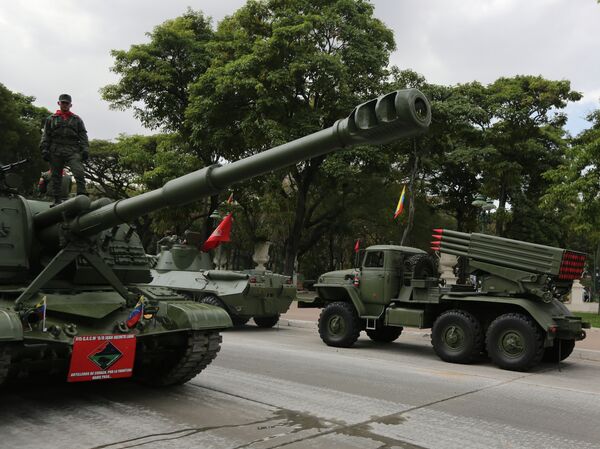
The Times presented Chavez to its readers as a dogmatic, violent narcissist, "[fascinated] with the sound of his own voice" who "went out of his way to attack…business leaders, bankers, newspaper owners, trade union bosses…even the Catholic Church". In a separate article that day, the paper further presented Chavez as full of "idiotic bombast" and suffering from a "Christ complex". Many other papers were similarly quick to engage is pseudo-psychological diagnosis of Chavez, portraying him as bedevilled by various deleterious mental disorders.
The Independent quoted a psychiatrist who said the deceased leader was a "narcissist", "impulsive", "temperamental" and "hypersensitive to criticism". The Daily Telegraph called him the "Latin American Kim Jong-il" — a "shrewd demagogue" who "failed to create an upsurge in employment", although UN figures show unemployment halved under Chavez, from 15 percent in 1999 to 8 percent in 2012. It also said he was "no intellectual", despite Chavez being a university lecturer before becoming president.
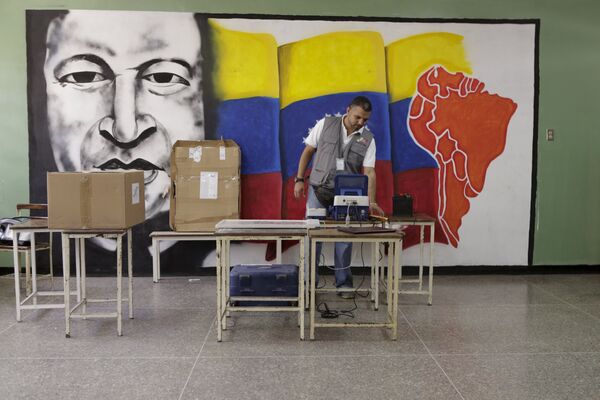
Chavez's legacy, the paper continued, was "decay, dysfunction and blight that afflict the economy and every state institution".
However, it was The Miami Herald which published the most negative obituary of all. Entitled "Venezuela's Hugo Chavez and his legacy of plunder", it described Chavez as having "methodologically [destroyed]" Venezuelan democracy through rewriting the constitution, "rigging elections" and stifling adversaries. As a result, Venezuela became, "a polarized society divided between intolerant supporters of Chavez's Bolivarian Revolution and a democratic opposition that, against all odds, has waged a courageous fight for a democratic alternative".
Flying the Coup
Such journalistic savagery was perhaps to be expected — the only truly surprising thing for Alan is Western reporting was somehow even more critical than the spirited condemnations of the fallen leader issuing from US government spokespeople, and Venezuela's right-wing opposition elements.
A similar tendency was nonetheless also evident in Western reporting on the abortive 2002 coup d'etat which removed Chavez from power for 47 hours. While the scale of US government involvement in the action remains unconfirmed, it is certain key figures involved — including Pedro Carmona, the country's unelected leader during Chavez's brief time out of office — were hosted by senior US officials in the months before it occurred. In Washington, these individuals met with key figures in the US military and intelligence nexus, who all had extensive histories of involvement in Latin America's various US-directed 'dirty wars' in the 1980s.
Moreover, via Freedom of Information requests, Venezuelan-American journalist Eva Golinger uncovered how the Central Intelligence Agency was well aware of the plot in advance. In an intelligence brief entitled 'Venezuela: Conditions Ripening for Coup Attempt' dated April 6, 2002 — five days before the coup was carried out — Agency staff explicitly state a coup was set to take place, staged by "dissident military factions, including disgruntled senior officers and a group of radical junior officers". In an attempt to provoke military action, the plotters would "try to exploit unrest stemming from opposition demonstrations." The events of April 11 2002 would follow this plan to the letter.
Upon the restoration of Chavez as President, his government was quick to suggest US involvement was highly likely. In response, Alan says newspapers dismissed this position as mindless conspiracy theorizing, "believed only by a few paranoid lunatics". All reporting stuck to the standard line — one fundamentally assuming unwavering American benevolence.
"The media said Iran, Iraq and Cuba all claimed it was a US plot — by implication, something only Ayatollah Khomeini and Saddam Hussein believed, but it was a factual point. Weeks later it became clear the coup was US-sponsored, which the New York Times and Washington Post did acknowledge — by saying Washington appeared to send a positive message to the coup plotters. So just for a short time, the US only gave the appearance of being on the wrong side. As ever with Venezuela, the media was presenting fact as accusation, and accusation as fact, as and when it suited them," Alan despairingly told Sputnik.
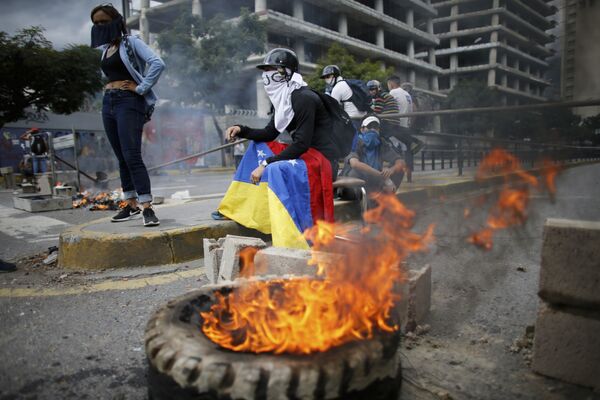
For its part, the New York Times said the Venezuelan government was "sticking to the old script".
"Venezuela is falling victim to a fascist conspiracy cooked up by American officials who are terrified of its revolutionary aspirations…the claim is outlandish, yet its ceaseless repetition reveals that to the Venezuelan government, all dissent is treason," its article continued.
Western media reporting of the protests also sought to portray protesters as "paragons of virtue," Alan says — a motley bunch of "peaceful model citizens standing up for their rights". A Daily Telegraph article described them as "family matriarchs carrying bibles after mass" being met with "barrages of tear gas" fired by government forces.
In reality, the protests had an extremely violent component, which included the beheading of passing civilians, and attacks on kindergartens, universities and health clinics. Visiting Cuban doctors were a particular target of demonstrators, with 160 being assaulted — protesters even attempted to burn some of them alive. Little if any of these reprehensible activities were given more than a passing mention in the Western media — while conversely opposition protesters killed or injured in the chaos were featured prominently and discussed in detail.
Similarly, there is little to suggest the protests were particularly widespread — in fact, they were fairly small, and largely restricted to wealthy districts of Venezuela. Predictably though, the media presented the strife as countrywide, and popular.
Manufacturing Consent
While a depressing state of affairs for anyone anywhere interested in the truth, Alan's forecast for the future of Western media reporting on Venezuela offers no respite — "this is going to continue happening, and perhaps get worse."
"What makes this all the more egregious is such a distorted picture isn't inevitable — alternative media outlets, such as Al Jazeera, The Real News, Democracy Now, RT and Venezuela Analysis for instance, are home to much more balanced coverage. My advice is to read information offered by a number of sources, often published in parts of the world without major geopolitical interests that are opposed to the Venezuelan government. If you rely solely on western mainstream sources, you'll keep getting the same distorted picture and story," Alan concludes.
The views and opinions expressed in this article are solely those of the speaker and do not necessarily reflect those of Sputnik.
